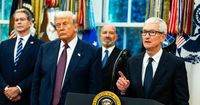Corporate America is facing a new era of presidential intervention as President Donald Trump, now well into his second term, has taken an increasingly aggressive approach to influencing private business decisions. In a series of bold moves this August, Trump has demanded executive resignations, imposed revenue-sharing arrangements, and pressured companies to align with his economic vision—actions that experts say mark a dramatic departure from traditional free market principles and set a precedent for future administrations.
On August 11, 2025, President Trump announced that the U.S. government would take 15% of Nvidia’s H20 chip sales in China as a condition for allowing those sales to proceed. According to NPR and The Wall Street Journal, this arrangement was described by many in the business community as unprecedented, with Treasury Secretary Scott Bessent suggesting that similar deals could soon affect other companies. Trump himself recounted the negotiation, stating, “I only care about the country. I don’t care about myself. And [Nvidia CEO Jensen Huang] said, ‘Would you make it 15?’ So we negotiated a little deal.”
Just a day after this announcement, on August 12, Intel CEO Lip-Bu Tan visited the White House following Trump’s public demand for his resignation over alleged ties to China. Dr. Meena Bose, a Hofstra University professor and director of the Kalikow Center for the Study of the American Presidency, described Trump’s demand as “one of the most aggressive public statements the president has made.” She added, “So much of President Trump’s second term is really charting an independent path, with very little attention to precedent — or in some ways, almost a rejection of precedent.” After their meeting, Trump reversed his stance, praising Tan’s “amazing story” and noting that Intel’s leadership would bring “suggestions” on how to move forward, leading to a recovery in Intel’s shares.
The pattern continued on August 13, when Trump turned his attention to Goldman Sachs, publicly criticizing CEO David Solomon and demanding that the bank replace its chief economist, Jan Hatzius. Hatzius had previously warned that Trump’s tariffs could increase consumer prices and damage the broader economy. Goldman Sachs declined to comment, though its shares rose in the aftermath of Trump’s remarks.
These interventions are not limited to technology and finance. Trump has also pressured major automakers not to raise prices and demanded that Walmart absorb the costs of his tariffs. He claimed credit for Coca-Cola’s recent announcement that it would use U.S.-grown cane sugar instead of corn syrup in its sodas—a move made at his urging. Media conglomerates have likewise felt the heat: In December 2024, Disney’s ABC settled a $15 million defamation lawsuit brought by Trump, and in July 2025, Paramount paid $16 million to settle allegations over CBS’s “60 Minutes” coverage of Vice President Kamala Harris during the 2024 election. The Paramount settlement came just days before the administration approved a merger with Skydance Media.
Perhaps most strikingly, Trump secured a “Golden Share” for the U.S. government as part of the merger between U.S. Steel and Japan’s Nippon Steel, granting the administration an outsized role in the newly merged company. Apple, too, has adjusted its corporate strategy in response to Trump’s threats. In early August, CEO Tim Cook visited the Oval Office, pledging billions in new U.S. investments after Trump threatened tariffs on Apple products sourced from India. Cook even presented Trump with a gold-plated glass sculpture, signaling a desire to stay in the president’s good graces.
The business community’s response has been largely muted. During Trump’s first term, CEOs were often vocal critics of controversial policies, such as the Muslim travel ban or the administration’s response to the Charlottesville rally. Now, most corporate leaders avoid public confrontation, opting instead to seek presidential approval and avoid the risk of public reprisal. High-profile executives like Tim Cook, Mark Zuckerberg, and Jeff Bezos attended Trump’s second inauguration in January 2025, a marked shift from their previous wariness.
Some experts see Trump’s approach as a new form of state intervention. Ryan Bourne, an economist at the libertarian Cato Institute, observed, “In a U.S. context, it’s unprecedented in modern history. It’s not so much free markets anymore. It’s fee markets.” He warned that such firm-specific deals and demands for executive ousters move the economy away from market-based competition and toward a system where “winners and losers are increasingly determined by cronyism rather than market forces.”
Jeffrey Sonnenfeld, a Yale University management professor, echoed these concerns, describing the climate as one where “the Marxist MAGA movement” is expanding control over private sector decisions. He cautioned that the only way for business leaders to defend their independence is through collective action, as individual opposition risks swift retribution from the White House. “CEOs remain reluctant to provoke Trump because of his vindictive power,” Sonnenfeld told NPR. He predicted that only a dramatic market downturn and worsening inflation—expected by year’s end—might embolden business leaders to speak out.
Despite these anxieties, the U.S. stock market has remained resilient. The S&P 500 index has continued to set records, even bouncing back from a sharp drop following Trump’s initial tariff announcements in April. Trump’s supporters point to this as evidence of his economic stewardship. White House spokesperson Kush Desai declared, “Cooled inflation, trillions in new investments, historic trade deals, and hundreds of billions in tariff revenue prove how President Trump’s hands-on leadership is paving the way towards a new Golden Age for America.”
Not everyone is convinced, however. A progressive strategist, speaking anonymously, acknowledged the effectiveness of Trump’s “bully pulpit” strategy, likening it to the approaches of FDR and Teddy Roosevelt. Yet they criticized Trump for using his position to pursue personal enrichment, particularly through newly formed crypto companies. Still, the strategist admitted, “If you want to do that, there’s now precedent, and Democrats should do that and not only use the pulpit, but take action when necessary. You can’t go back to normal after this.”
Legal scholars warn that the current climate, combined with favorable Supreme Court rulings on executive authority, leaves corporations with little practical recourse. Jeffrey Gordon, a Columbia University law professor, noted, “You’ve got a president who’s got unknown bounds on his authority and an appetite for battle—the easy thing to do is give in, which is what we’re seeing.”
As 2025 draws to a close, President Trump’s assertive approach to corporate America has reshaped the landscape of business-government relations. Whether this “hands-on” model will deliver the promised golden age or sow the seeds for future economic and political turmoil remains to be seen, but for now, silence and compliance have replaced the open criticism that once defined the relationship between the White House and the boardroom.




